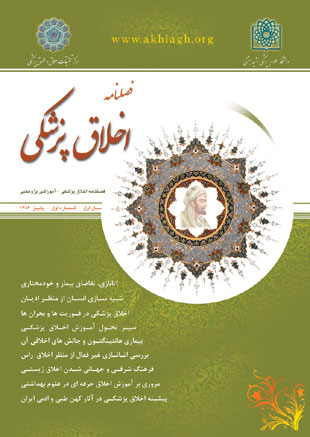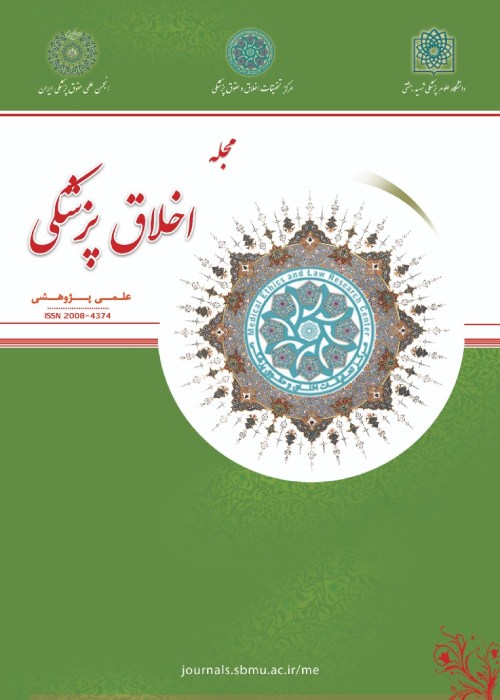فهرست مطالب

فصلنامه اخلاق پزشکی
پیاپی 1 (پاییز 1386)
- تاریخ انتشار: 1386/09/13
- تعداد عناوین: 6
-
Pages 7-8
-
Pages 9-15Although criminal law has never been completely distinct from morality, considerable controversy has always existed, among lawyers and philosophers about the nature and extent of their co- relationship. In other words, there exist opposing views on whether or not a forbidden conduct committed against commands of morality should necessarily be a criminal offence, punishable in the eyes of the law. This issue and the answers given to this question by English law and Islamic law have been discussed in this article from a comparative perspective.Keywords: Morality, Law, English law, Islamic law
-
Page 14Inherent dignity is one of the great qualities of human and fundamental rights of all human beings, so that no condition makes it conditional. In this respect, there are many beneficial discussions in teachings of the divine religions and especially on the life giving school of Islam, a sample of which can be downgraded as follows, so that human being has been turned into an unprecedented position in terms of inspiration of the Divine Spirit and consequently, many blessings have been brought about for him through attaining such sublime position. Of course, all Muslims and the Worlds have been tasked with safeguarding this inherent dignity. The inherent dignity of human is a universal and innate rule which cannot be imitated. The necessity of observations of this important effect has also been reflected in the constitution of the Islamic Republic of Iran. To expand inclusion of this rule in the international arena, the need to safeguard human dignity has been reiterated and crystallized in documents such as Universal Declaration of Human Rights, Declaration on Human Genome, Declaration of Helsinki, International Declaration of Bioethics, UNESCO (United Nations Educational, Scientific, and Cultural Organization) Human rights, etc.Keywords: Human Dignity, Divine Religions, Man, Islam, Bioethics, International Documents
-
Pages 37-45Secular bioethics has only recently begun to take religious perspectives seriously. Religion and Medicine courses in a number of universities across North America have incorporated Christian and Jewish perspectives for some time now, but Islamic, Buddhist and Hindu perspectives are only now gaining recognition. This late inclusion of Islamic perspectives can be partially attributed to the lack of materials in English on Islamic bioethics. Moreover, those materials that have been published actually deal with juridical religious opinions rather than ethical deliberations based on principles and rules as developed in Islamic legal sciences. Here and there in these writings one reads references to the principle of public interest (maslaha), without any elucidation about its function, either as a principle in legal theory or as a rule of utility or beneficence that promotes the good in ethical decision-making. Instead, we have a plethora of juridical opinions (fatawa, plural of fatwa) deduced from the revealed texts on issues in biomedicine like abortion, end of life decisions, and more recently, genetic engineering or stem cell research, without any ethical discussion on the rightness or wrongness of the act in its medical scientific and clinical practical settings.Keywords: Islamic Bioethics, Secular Bioethics, Religion
-
Pages 46-55Daily development of the human knowledge, promotion of biomedical technologies and improvement of physicians'' ability in diagnosis and treatment of different types of diseases have always accompanied plenty of discussions and challengeable subjects, especially from the view point of ethical issues. Obtaining deep and accurate recognition of these subjects, the attention of the physicians and the scholars of different fields, especially of the ethics has been drawn to medical ethics as a new solution in the comprehensive Healthcare System. Despite the great changes in medical technologies, there are still some concerns about the physicians'' abilities in decision makings that may directly or indirectly affect the health or life of the people. Therefore these concerns have leaded to the appearance of new movements all calling for the patients'' rights and the rights of society to participate in medical decision-makings. On the other hand we should notice about some other cases that play effective roles in policy makings of the comprehensive healthcare system. Fore instance, the required resources will vary following the changes in technology; the population especially of the elderly is increasing; moreover the time needed for the new work forces to be entered into the labor market has typically increased. Consequently, a higher number of people are waiting to benefit from the recourses and lower number of them is involved in producing the recourses. Thus, to work on the important topics like the requirements of human societies, ethical considerations of biotechnology and medical researches, Allocation of limited and immense resources, important ethical criteria of decision makings, representation of fundamental solutions and medical ethics trainings is considered as one of the most basic necessities of comprehensive healthcare system among others.Keywords: Medical Ethics, Recourse Allocation, Policy Making, Comprehensive Healthcare System
-
Pages 56-66Modern medical ethics is considered as a multi-disciplinary knowledge and is seen as a part of medical school''s curriculum nowadays. Identity of medical ethics curriculum is formed by the sub-structural contexts of this science as well as belief and value essentials of the society and we cant codify medical ethics curricu-lum separated from belief, culture, value context and essentials of society. So, this study was performed for deeper and real recognition of existing ambiguities and challenges in the identity of medical ethics curricu lum. This study is a qualitative research, which its data was gathered through making a semi-structural inter-view with 14 people of Tehran medical universities Medical Ethics instructors in 1389, analyzed by the Mayring context analysis approach. Results of this study indicate the lack of identity in medical ethics cur-riculum. Contents implicating on the lack of native and Islamic identity in medical ethics curriculum are men-tioned as:1. Secular medical ethics
2. Islamic ethics system
3. Medical ethics domain
In fact the lost ring of medical ethics curriculum is lacking of an Islamic and native identity and because of this , the medical ethics topics placed in medical ethics curriculum without any specific base of teaching in this regard so, it seems we always face to confusion and going to promote the secular culture.Keywords: Medical Education, Curriculum, Medical Ethics, Principles of Medical Ethics, Identity


